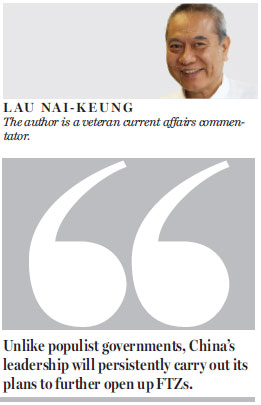Lau Nai-keung says critics of the new free trade zones are wrong and short-sighted because in time the FTZs will offer enormous benefits to Hong Kong
The world is talking about "One Belt, One Road" and the Asia Infrastructure Investment Bank (AIIB), but perhaps they should also be paying more attention to another area of significant reform: free trade zones (FTZs).
After the 2013 launch of the Shanghai Free Trade Zone, the Guangdong Free Trade Zone was launched last month. Also planned are two further FTZs in Fujian and Tianjin.
The central government says the new free trade zones will be based on Shanghai's FTZ model, which is being used as a testing ground for the liberalization of finance, investment and trade. The central government also says the new zones will include institutional innovations with their own "local characteristics".
The Guangdong FTZ covers 116 square kilometers and includes Guangzhou's Nansha New Area, Qianhai and Shekou in Shenzhen as well as Hengqin in Zhuhai. According to Zheng Jiarong, deputy head of the Guangdong provincial department of commerce, the Guangdong FTZ will "focus on pioneering new legal systems based on the opening-up policy". At the same time, the Guangdong provincial government will try to develop the FTZ to encourage collaboration with Hong Kong and Macao in areas such as international mediation and dispute resolution.
Some remain skeptical of the new FTZs, arguing that they have suspect legal systems. This is often said to be the reason for Hong Kong's competitiveness. But if things were that simple, Britain, from whom we inherited our legal system, would be the most competitive country in the world.
But what if the Guangdong Free Trade Zones adopt something resembling our system when they pioneer their "new legal systems"? If these new legal systems can enable Guangdong to work together with us on more things than previously thought, could this mean one day they may also do this alone without us?
People in Hong Kong and overseas in general are not taking these FTZs seriously. A few days after the establishment of the Guangdong FTZ, Charles Liu wrote that "Skeptics doubt China's new free trade zones after Shanghai example". The article also said, "Not much has happened so far".
Liu's argument is based partly on the fact that the Shanghai FTZ promised a number of financial reforms which included full convertibility of the yuan and free interest rates. But none of these things have happened yet. The American Chamber of Commerce in Shanghai has also announced that 73 percent of the 377 companies that responded to its annual business climate survey reported that the Shanghai FTZ offered them "no tangible benefits".
Now hold on! The Shanghai FTZ was only launched in 2013. People should not expect instant results. China's Great Western Development Strategy is informative in this regard.
In order to narrow the country's east-west disparity, the State Council created a leadership group for western development in January 2000, led by then premier Zhu Rongji. There was a time when that the idea of great western development became fashionable, not unlike today's "One Belt, One Road." There were no instant results as the strategy involved long-term plans in the form of infrastructure construction. After a few years, people lost interest. It was not until recently that we saw some concrete achievements of this strategy. One of which was that former migrant workers from western China could now find comparable job opportunities nearer to home. But this led to labor shortages in coastal areas.
Soon media attention will move away from these FTZs to other trendy topics. But unlike populist governments, China's leadership will persistently carry out its plans to further open up FTZs. One day, the skeptics will realize the FTZs are fully developed in terms of infrastructure. These zones also have the potential to expand over large areas.
People need to be much more positive about these developments. The "end of history" thesis has been proven wrong. Even one of its key proponents, American political scientist Francis Fukuyama, has abandoned it. But many in Hong Kong still believe certain political, economic, or social systems are the perfect form of human government. To them, the ideal political system is our current model along with "genuine democracy".
But the mainland is constantly updating its political, social and economic systems. Hong Kong is not updating and this will ultimately cause us problems in the future. This is why people must seize these new opportunities now!

(HK Edition 04/14/2015 page11)
Guadalupe, a 55-year-old lady living in Spain, has been practicing tai chi for almost 20 years. She believes tai chi is not only a kind of martial art but a complete system of fusing traditional Chinese culture.

One of the potentially most traumatic things a girl has to go through is finding a new hairdresser.